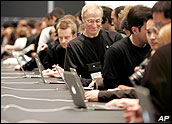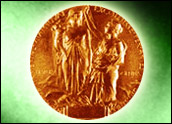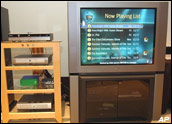
A new company is working to index the real world. Sense Networks officially launched its CitySense and MacroSense activity-tracking services Monday.
The services use a combination of cell phone data, WiFi activity and vehicle GPS (Global Positioning System) locations to measure where crowds are — and then put the information to use in a number of ways.
The Social Side
Perhaps the most widely discussed feature is Sense Networks’ CitySense service. The program, available so far only in San Francisco, lets you look at real-time maps to track crowd activity and discover, for example, which nightclubs are busiest on any given evening. The company compares the concept to traffic maps that let you see which roads are most congested.
“I was fascinated with the concept of all the data being generated everywhere in the world because of mobile phone networks, location technologies, WiFis — all the data being generated just by people doing nothing, just by having a phone in their pockets,” said Sense Networks CEO and cofounder Greg Skibiski.
“I thought, what can you use the data for, and what kind of technology would you use to analyze it — and that just didn’t exist,” he told TechNewsWorld.
Skibiski and his three other cofounders — one of whom is MIT’s director of human dynamics research — wanted to find a way to use the data for business analysis. They also, though, wanted to develop a tool that’d give consumers a cost-free benefit. That’s where the idea for CitySense started.
The program lets you use your BlackBerry — and soon, your iPhone — to map out a city’s hotspots at no cost. Once you sign up, it remembers what kind of locations you frequent and then compares your movements to users with similar patterns. That feature, Skibiski said, opens up a whole new kind of social networking.
“If you run the CitySense on your BlackBerry, it’s learning about your locations where you spend time so it can personalize services in the future. It can show you not only where is everybody, but where is everybody like me,” he explained.
Business Benefit
Sense Networks’ bigger focus is the business side of its application, MacroSense. The service offers companies the ability to harness all the electronic data currently just floating around.
“Big retailers want to know where to put their store, what traffic patterns look like. They want real-time data on consumer behavior,” Skibiski said.
MacroSense offers a company information ranging from where else its customers shop to how far people travel to get to its stores. Like Web analysis tools, it can even determine where customers were immediately prior to entering the business — a real-world “referring site” kind of concept.
The next step for Sense Networks will be opening its application to third-party developers. That, its founders hope, will allow companies to get kinds of customized reports never before available.
“If [companies] want to analyze shopping behavior, they’d put their data in about their customers, we’d run our models on it and send it back to them,” Skibiski said. “For every user you have, there are 10,000 people like them. Nobody has the technology to analyze that data themselves. We’re going to open the platform so anybody can do it.”
An Eye on Privacy
The service raises plenty of questions about privacy — and Sense Networks has plenty of answers. All its data is aggregate and anonymous, meaning no specific users can be identified and anyone can remove their information at any time.
“Unlike Google, where you don’t own your own Google searches, people own all their own data in our system,” Skibiski told TechNewsWorld. “This is America. Everybody should have the choice to do whatever they want.”
Users have an option to delete either their data from the past 24 hours or all their data while connected to the CitySense service. Still, the concept indicates just how connected society has become in the modern electronic age.
“It’s not something we didn’t know was coming,” said Theodore Claypoole, an attorney with expertise in electronic privacy. “The physical location of where you are is becoming less private. I think we need to get used to it.”
In a world with Web-linked traffic and security cameras, Claypoole pointed out, it’s becoming harder and harder to remain completely anonymous.
“Even billboards are starting to have cameras that can identify who’s watching them,” he told TechNewsWorld. “Police can right now use any of this information to track you down and find you. So the question becomes when can your girlfriend, or your boss, or your prospective boss [do the same].”
The kind of uses we’re seeing today, Claypoole says, may only be the beginning of location-based data collection we’ll see in the coming decades.
“Part of it is the entire science of learning about how we use this data to hone our sales techniques — how big business does that, and how they would have any incentive to keep your data private,” he said.
Sense Networks is well-aware of the potential problems but says its stance on privacy will not change.
“The feeling we should have with technology is that we control it, not that it’s controlling us,” Sense Networks’ Skibiski said. “You could just look at our application and be like, ‘It’s tracking you and it’s evil’ — but it’s a lot bigger than that.”





















































